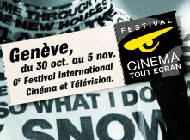Geneva festival showcases small screen gems

Television companies have become major players in the world of cinema, and some of the best films are being produced for the small screen. The evidence is on show this week in Geneva, at one of Europe's top festivals for television films.
“Cinéma Tout Ecran” is now in its sixth year and already it has become one of the most important stopping-off points for television producers and commissioning editors. Its main selling point is quality.
“Our aim is to prove that quality doesn’t depend on the format or the medium, but on the quality of the filmmaker,” says Stephanie Billeter, head of programming and spokesperson for Cinéma Tout Ecran. “We want to show that there is no real frontier between television and cinema.
“When the festival started six years ago, television and cinema were very much separate,” Billeter told swissinfo. “Now there’s a lot of cross-over between the two and many big television companies have set up their own production companies.”
Many companies, like TF1 in France and Channel 4 in Britain, are credited with helping to revitalise the film industry in their respective countries.
Another is DRTV in Denmark, which has helped to co-produce some of the films in the celebrated Dogma movement. DRTV is guest of honour at this year’s Cinéma Tout Ecran.
“Denmark can provide a good example to Switzerland. It’s a small country but it has proved it can make high-quality cinema that can be seen all over the world. Television has played a big role in that,” Billeter says.
“We’ve invited them to learn from their experience, to see if we can do the same here, or perhaps work together,” she adds.
Switzerland, though, has problems that the Danes have not had to overcome, notably the fact that it has three main language groups, served by three different television channels.
Cinema Tout Ecran is ideally placed, however, to help these Swiss channels attract funding or, more often, partnerships with German, French and Italian channels for co-productions.
It’s the presence of so many decision-makers from the world of television that has made the festival such an important place to visit, and why the organisers have set up a “market” where buyers and distributors can view new dramas and series.
“They like coming here, because they can see these high-quality films in good conditions,” Billeter says.
The festival is not all about doing deals. One of the most important aspects is the international competition for new television films.
This year, 14 films from 11 countries are in the main competition. They include “Fail Safe”, directed by Stephen Frears, and produced by George Clooney. It was the first live feature-length drama since the 1960s, and the kind of project that could only be done on television.
Other films in competition include “Himitsu”, by the Japanese director, Yojiro Takita, “Het Paradijs” by the Dutch director, Maarten Treurniet, and two Swiss films, “Der letzte Sommer” by Sascha Weibel and “15, rue des Bains” by Nicolas Wadimoff.
The festival also traditionally has a retrospective devoted to great moviemakers on the small screen. This year it is focusing on just one director, Rainer Werner Fassbinder, and one of his finest works, “Berlin Alexanderplatz”.
by Roy Probert

In compliance with the JTI standards
More: SWI swissinfo.ch certified by the Journalism Trust Initiative
You can find an overview of ongoing debates with our journalists here . Please join us!
If you want to start a conversation about a topic raised in this article or want to report factual errors, email us at english@swissinfo.ch.